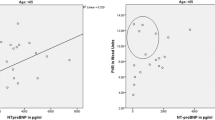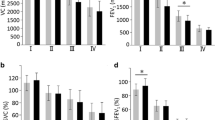Abstract
Prostate-specific antigen (PSA) is the most important biochemical marker in the diagnosis and follow-up of patients with prostate cancer. In recent years, a relationship between PSA levels and hypoxic conditions has been described. However, no study has investigated the PSA levels in patients with chronic obstructive pulmonary disease (COPD). The aim of the present study was to investigate the impact of hypoxemia on serum total (tPSA) and free PSA (fPSA) levels in patients with COPD. Between January 2010 and January 2014, 95 male patients who hospitalized for acute exacerbations of COPD and 80 control subjects were enrolled in the study. Serum tPSA and fPSA levels and f/tPSA ratios were determined in all patients on the first day of hospitalization (exacerbation) and 7 days after the treatment (stable state). Statistical analysis included paired t test and Mann–Whitney U test. No statistically significant differences were found between COPD and control groups with regard to the baseline characteristics, except for smoking status. The levels of serum tPSA and fPSA during exacerbation of COPD were significantly higher than the levels of the stable period (p < 0.01), whereas f/tPSA ratio did not change (p > 0.05). Hypoxemia during acute exacerbation of COPD can cause a rise in serum tPSA and fPSA levels, but f/tPSA ratio is not affected. Acute exacerbation of COPD may be added to list of the events in which PSA measurements must be interpreted with caution.
Similar content being viewed by others
References
Heidenreich A, Abrahamsson PA, Artibani W, Catto J, Montorsi F, Van Poppel H, et al. Early detection of prostate cancer: European association of urology recommendation. Eur Urol. 2013;64:347–54.
Carter HB, Albertsen PC, Barry MC, Etzioni R, Freedland SJ, Greene KL, et al. Early detection of prostate cancer: AUA guideline. J Urol. 2013;190:419–26.
Oesterling JE, Rice DC, Glenski WJ, Bergstralh EJ. Effect of cystoscopy, prostate biopsy and transurethral resection of prostate on serum prostate-specific antigen concentration. Urology. 1993;42:276–82.
Koller-Strametz J, Fritzer M, Gwechenberger M, Geppert A, Heinz G, Haumer M, et al. Elevation of prostate-specific markers after cardiopulmonary resuscitation. Circulation. 2000;102:290–3.
Koreny M, Koller-Strametz J, Geppert A, Karth GD, Heinz G, Maurer G, et al. Elevation of prostatic markers following cardiogenic shock. Intensive Care Med. 2001;27:447.
Netto NR, Lima ML, Guedes MA, Patino LL, De Oliveira JB. Elevation of prostate specific antigen in cardiac surgery with extracorporeal cardiopulmonary circulation. J Urol. 1998;159:875–7.
Global initiative for chronic obstructive lung disease. Pocket Guide to COPD diagnosis, management, and prevention, 2011.
Kent BD, Mitchell PD, McNicholas WT. Hypoxemia in patients with COPD: cause, effects, and disease progression. Int J Chron Obstruct Pulm Dis. 2011;6:199–208.
Kim V, Benditt JO, Wise RA, Sharafkhaneh A. Oxygen therapy in chronic obstructive pulmonary disease. Proc Am Thorac Soc. 2008;5:513–8.
Guvel S, Turkoz R, Egilmez T, Kilinc F, Yaycioglu O, Atalay H, et al. Does ischemia-induced prostate damage during cardiac surgery involving cardiopulmonary bypass cause bladder outlet obstruction? Urol Int. 2005;74:337–40.
Patane S, Marte F. Prostate-specific antigen kallikrein: from prostate to cardiovascular system. Eur Heart J. 2009;30:1169–70.
Gan WQ, Man SF, Senthilselvan A, Sin DD. Association between chronic obstructive pulmonary disease and systemic inflammation: a systematic review and a meta-analysis. Thorax. 2004;59:574–80.
Jansen FH, Roobol M, Jenster G, Schroder FH, Bangma CH. Screening for prostate cancer in 2008 II: the importance of molecular subforms of prostate-specific antigen and tissue kallikreins. Eur Urol. 2009;55:563–74.
Stenman UH. Detection of complexes between prostate-specific antigen and protease inhibitors in plasma. Clin Chem. 2010;56:1895–6.
Agusti AG. Systemic effects of chronic obstructive pulmonary disease. Proc Am Thorac Soc. 2005;2:367–70.
Patane S, Marte F. Prostate-specific antigen kallikrein and acute myocardial infarction: where we are. Where are we going? Int J Cardiol. 2011;7:e20–2.
Charlesworth MC, Young CY, Miller VM, Tindall DJ. Kininogenase activity of prostate-derived human glandular kallikrein (hK2) purified from seminal fluid. J Androl. 1999;20:220–9.
Frenette G, Tremblay RR, Lazure C, Dube JY. Prostatic kallikrein (hk2), but not prostate-specific antigen (hk3), activates single-chain urokinase-type plasminogen activator. Int J Cancer. 1997;71:897–9.
Hoiseth AD, Omland T, Hagve TA, Brekke PH, Soyseth V. Determinants of high-sensitive cardiac troponin T during acute exacerbation of chronic obstructive pulmonary disease: a prospective cohort study. BMC Pulm Med. 2012;6:22.
Conflict of interest
None.
Author information
Authors and Affiliations
Corresponding author
Rights and permissions
About this article
Cite this article
Ozge, C., Bozlu, M., Ozgur, E.S. et al. The impact of hypoxemia on serum total and free prostate-specific antigen levels in patients with chronic obstructive pulmonary disease. Med Oncol 32, 156 (2015). https://doi.org/10.1007/s12032-015-0602-2
Received:
Accepted:
Published:
DOI: https://doi.org/10.1007/s12032-015-0602-2




